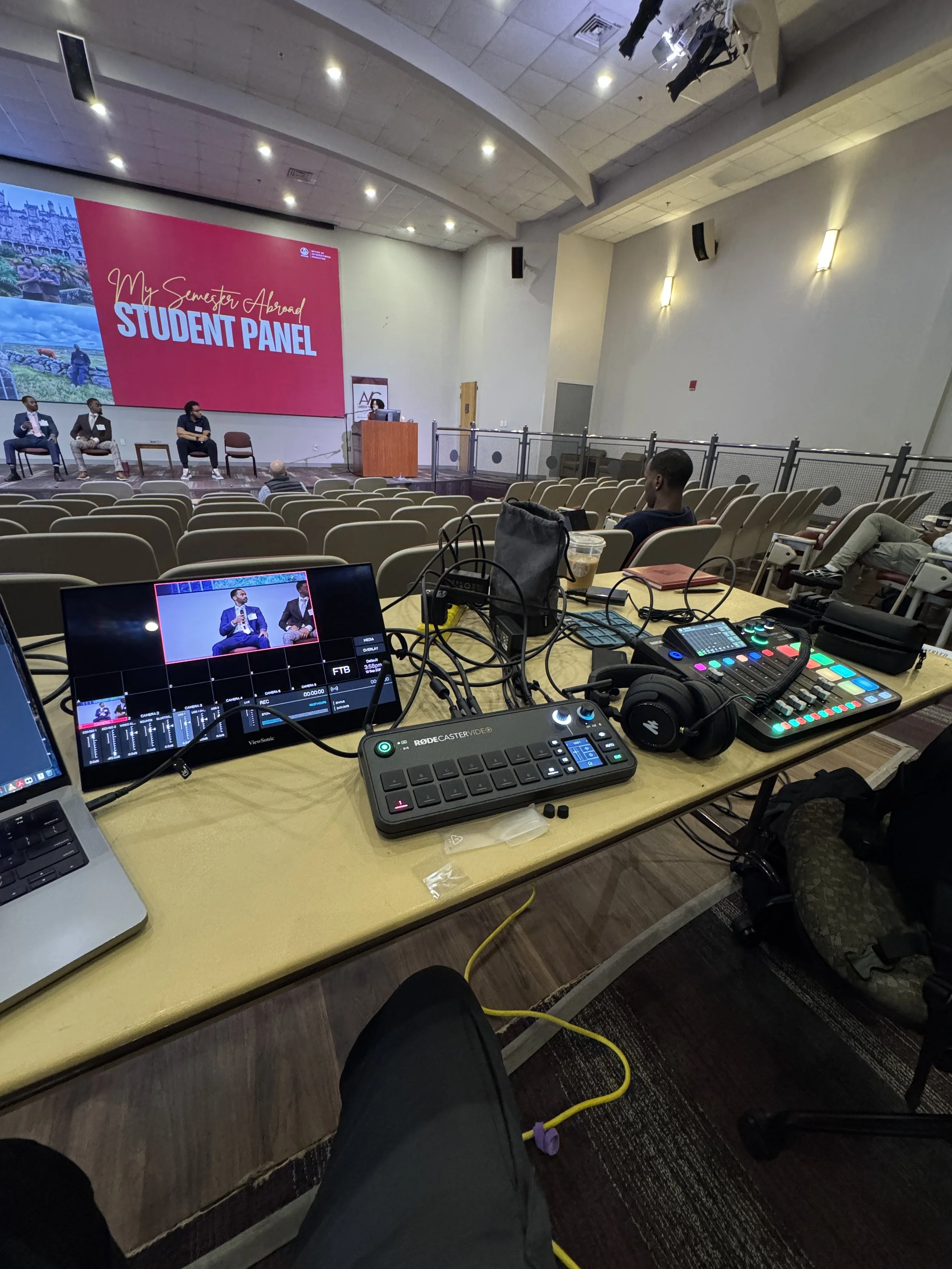
Multi-Camera Production Program
The Morehouse Multimedia Center's (MMC) Multi-Camera Production Program offers a unique and immersive opportunity for students to master the art of live broadcast and event coverage. Our program is designed to take you beyond the classroom and put you directly behind the scenes of dynamic, real-world productions.
In this program, you will learn to operate state-of-the-art multi-camera setups, seamlessly integrate graphics, and deliver professional, dynamic broadcasts. We believe in learning by doing, which is why our curriculum is built around hands-on workshops and direct experience. You won't just study production—you'll be part of the crew.
Students in the program join the team responsible for Morehouse's live event coverage, including exciting broadcasts of our basketball and football games. You will gain invaluable experience by working alongside seasoned professionals, using the same professional-grade equipment found in major broadcast studios.
Whether your goal is to direct a live show, operate a camera, or mix a broadcast, our program provides the skills, knowledge, and practical experience needed to succeed in the fast-paced world of live production. Join us and help bring the spirit of Morehouse to life for audiences everywhere.
Roles & Responsibilities
-
Production Manager
The Production Manager is the backbone of the entire project, handling the practical, financial, and logistical aspects. They are responsible for budgeting, creating schedules, and coordinating all the different production departments. They work closely with the director and designers to ensure the project stays on budget and on schedule. A key part of their role is building and motivating a collaborative team, overseeing all meetings, rehearsals, and overall production preparation.
-
Producer
The Producer plans and coordinates all activities for the client, working to bring their vision to life. They are involved in every aspect of the client's needs, including planning and budgeting. A freelance producer may also handle technical, production, and account management, gaining a wide range of experience from directing to technical work.
-
Director
The Director is the creative visionary who oversees the artistic and dramatic elements of the production. They are responsible for visualizing the script and guiding the cast and crew to achieve that vision. The director organizes the crew and communicates with actors to ensure all artistic and technical elements come together seamlessly.
-
Script Supervisor
The Script Supervisor is the guardian of continuity. They ensure that all scenes flow logically and consistently. They take detailed notes during shooting to help the editor during post-production and to maintain visual and narrative continuity. They also time the script before shooting begins, a crucial skill for managing production time.
-
Production Designer
The Production Designer is responsible for the overall visual look and feel of the production. They set the tone for the entire set by reviewing the script and working with the director and producer to create the desired setting. They also manage the art department budget and schedule and must approve all finished sets and locations before shooting begins.
-
Floor Manager
The Floor Manager is the essential link between the control room and the people on the studio floor, including presenters, talent, and the audience. Wearing an earpiece and microphone, they are in constant contact with the director, relaying cues and information to the talent while also providing real-time updates back to the control room. They are responsible for making sure everything on the studio floor runs smoothly.
-
Camera Operator
The Camera Operator is responsible for all camera equipment. Their duties include setting up cameras, tripods, and other equipment like cranes. They must have a strong understanding of the script and be ready to experiment with new ideas and shots. They operate the cameras, ensuring everything is in focus and framed correctly.
-
Audio Tech
The Audio Tech operates and maintains all sound equipment. They are responsible for recording, amplifying, and mixing sound. Their job involves identifying the sound requirements for each situation, setting up and testing equipment, and making necessary adjustments. They are involved in both production and post-production.
-
Lighting Tech
The Lighting Tech is a creative and technical role. They ensure subjects are lit appropriately and use lighting to create specific moods and emotions, from a relaxed atmosphere to tension and drama. Their work helps tell the story and can even foreshadow plot points or character arcs.
-
Vision Mixer
The Vision Mixer works in live TV production, switching between cameras and adding effects under the director's command. They are responsible for live-editing the show and must have quick response times. They do not have independent control; they follow the director's specific instructions. They must be calm under pressure and have a strong understanding of technology and live TV production.
